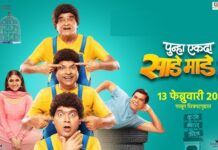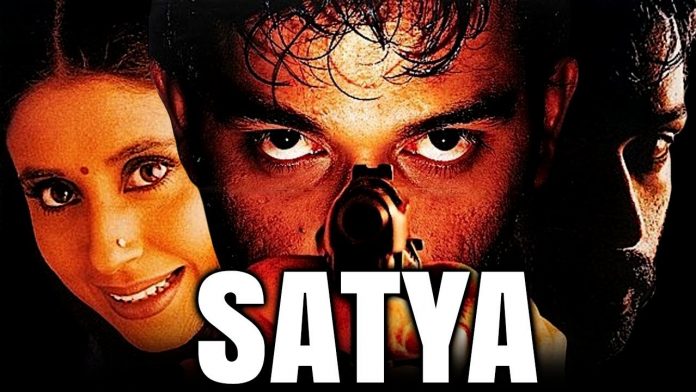SATYA
Varma Corporation Ltd.’s Satya (A) is the story of the underworld told in a very realistic manner. It neither highlights crime nor shows the police in a bad light. The film also attempts to show that those in the underworld are also human beings and do have a family life like the rest of the world.
A young educated guy comes to Bombay and is drawn into the world of dons although he never nursed a desire to be a part of it. But once in it, he becomes a dreaded name in the underworld, not just for his skill but also for his sharp brain and intelligence. He falls in love with his neighbour, a lower-middle class girl who is trying to make it in the word of playback singing. One day, he decides to confess to his beloved, of the life he is leading and also of his plans to leave the country (with her) to start life afresh, away from the underworld. But before he can do so, he is nabbed by the police. His girlfriend, who is till then unaware of his activities, is shattered when the truth about his connections comes to her knowledge in such circumstances. Although he pleads with her to hear him out, she does not give him a second chance. Ultimately, he is killed by the police.
The film is stark and leaves the viewer numb with shock. Its making is brilliant and the technical finesse is astonishing. Sound effects and the background score are splendid, adding to the tension in the drama.
But the technique and the sincerity of director Ramgopal Varma notwithstanding, the film appears to have been made for a select audience only. It will appeal to the classes and the city audiences, mainly in Maharashtra. The underworld lingo used is of the kind typical to Maharashtra, hence the sectional appeal. Censors have been liberal (perhaps, as a reward for the film’s authenticity), and a lot of swear words have been allowed in the dialogues. Ladies will, however, find it difficult to take so many swear words, besides the gruesome violence. That would also limit the business prospects.
J.D. Chakravarthy suits the role very well and gives a restrained performance as a thinking underworld guy with a mind of his own. Urmila Matondkar excels as his beloved, playing the poor girl’s character to near-perfection. Manoj Bajpai delivers an award-winning performance as the hero’s friend. Shefali Chhaya, as his wife, is cute and natural to the core. Paresh Rawal is good. Saurabh Shukla lives his role. Govind Namdeo does a fine job. Aditya Srivastav shines. Makrand Deshpande, Raju Mavani, Sabeer, Rajesh Joshi and Sanjay Mishra provide able support.
Ramgopal Varma’s direction deserves distinction marks. His handling of the subject is remarkable. Vishal’s music is a major letdown. Actually, a tense drama of this kind could have done with hit music, but most of the songs in the film are dull and boring. The wedding song is the better of the lot. The light scenes in the film are well-placed but the humour again is subtle and, therefore, of the kind that can be appreciated more by the elite. Action scenes have fresh composition. Dialogues are very natural.
On the whole, Satya has appeal for Bombay and other big cities in Maharashtra mainly. It should also do well in cities in C.I. and South on the strength of mouth publicity. But given its dull start, lack of face value and poor music on the one hand, and high theatre rentals on the other, it may not really get a chance to grow in the rest of the country as well as at the smaller centres in the aforementioned parts.
Released on 3-7-’98 at Eros and 15 other cinemas of Bombay thru V.I.P. Enterprises. Publicity: very good. Opening: so-so. …….Also released all over. Opening was good in Lucknow, Nagpur and a couple of other cities but dull in most other places.
LATEST POSITION
Heavy rains throughout the week, in Bombay and various other parts of Maharashtra have adversely affected box-office collections.
Major Saab started dropping from 5th/6th day onwards. Maximum drop (alarming) was noticed in Gujarat, Saurashtra, Bombay, Rajasthan and C.P.C.I. The drop notwithstanding, the film will fetch commission in most of the circuits on the strength of its initial value and, of course, its reasonable price in many circuits. The film was re-edited mid-week in some cinemas of Bombay. 1st week Bombay 52,21,530 (84.32%) from 13 cinemas (7 on F.H.); Ahmedabad 7,70,643 from 4 cinemas, Rajkot 1,84,802, Jamnagar (27 shows) 1,63,640; Pune 12,35,932 from 6 cinemas (1 in matinee), Solapur 3,14,472 from 2 cinemas; Delhi 47,30,303 (87.97%) from 10 cinemas (1 on F.H.); Kanpur 5,31,932 from 2 cinemas, Lucknow 3,84,410 (100%), Agra 4,03,879, Allahabad 1,89,077, Bareilly 1,49,820 (78.55%), Dehradun 2,31,312 (87.77%), Muzaffarnagar 1,18,839, Saharanpur 1,67,325, Hardwar 70,000; very good in East Punjab, Amritsar 65,500; Calcutta (6 days) 21,77,749 from 16 cinemas; Nagpur 6,88,149 from 5 cinemas, Jabalpur 2,53,101, Amravati 1,65,919, Akola 1,45,092, Dhule 1,07,878, Raipur 2,15,303 (69.57%), Bhilai 1,33,184, Jalgaon 1,36,408, Yavatmal 1,02,981, Bilaspur 2,10,176 from 2 cinemas; Indore 4,13,541 from 2 cinemas (2 on F.H.), Bhopal 4,77,963 from 3 cinemas; Jaipur 9,27,766 from 5 cinemas, Udaipur 2,35,870; Hyderabad 33,69,488 from 18 cinemas (2 in noon), share 16,92,000, Aurangabad share 3,20,000 from 3 cinemas; Visakhapatnam 1,76,000.
Ghulam has maintained extremely well in Maharashtra (despite rains) but has dropped in other circuits, at several places by 40-50%. 2nd week Bombay 40,07,696 (84.24%) from 13 cinemas (5 on F.H.); Ahmedabad 5,58,664 from 4 cinemas, Rajkot 1,18,810, Jamnagar (matinee) 15,646; Pune 11,15,608 from 5 cinemas (1 in matinee), Solapur 1,66,868 from 2 cinemas (1 in matinee, 1 in daily 2 shows); Belgaum 1,17,476, 1st week Bijapur 1,34,000; 2nd week Delhi 21,64,408 from 8 cinemas; Kanpur 2,39,819 from 2 cinemas, Lucknow 2,71,828, Agra 1,40,675, Allahabad 1,15,000, Dehradun 1,25,469; Nagpur 3,04,588 from 2 cinemas, Jabalpur 2,08,234, total 4,57,167, Amravati 1,95,060, total 4,61,721, Akola 1,09,327, total 2,95,636, Dhule 77,000, Raipur 1,42,443, Bhilai 1,08,149, Jalgaon (6 days) 1,51,917, Chandrapur 1,15,435, total 3,31,201, Bilaspur 1,08,481; Indore 1,06,290 (1 on F.H.), Bhopal 1,86,313 from 2 cinemas; Jaipur 2,88,321 from 2 cinemas; Hyderabad 11,11,362 from 5 cinemas (1 in noon).
………..
Jab Pyaar Kisise Hota Hai 6th week Bombay 9,71,817 (58.09%) from 4 cinemas (5 on F.H.); Baroda 91,609, Jamnagar 36,410, total 3,70,974; Pune 2,40,541 from 2 cinemas (1 in matinee), Solapur 47,198, 2nd week Barsi 17,906; 6th week Belgaum 76,818; Delhi 18,23,216 from 5 cinemas (1 on F.H.); Kanpur 66,000, Lucknow 79,194, Allahabad 30,342, 2nd week Hardwar 32,000, 6th week Bareilly (6 days) 37,944 (19.67%), Dehradun 37,000; Calcutta (6 days) 2,55,747 from 3 cinemas; Nagpur 1,24,325, Jabalpur (6 days) 90,803, Akola (26 shows) 33,200, total 4,01,274, 5th week Raipur 52,229, total 4,24,338, Jalgaon 5 weeks’ total 4,30,000, 1st week Wardha (5 days) 76,028, 6th week Chandrapur 63,240, total 6,39,764, 5th week Bilaspur 19,213; 6th Bhopal 1,54,393; Jaipur 2,32,976; Hyderabad 3,31,707 from 3 cinemas (2 in noon).
YOU ASKED IT
Why are action films considered safer bets than, say, social films?
– Because even today, action films have more takers in small centres.
What needs to change the most in the film industry, to take advantage of the industry status?
– The mindset of the industry people in general and producers and actors in particular.
What is the progress of Time’s Hu Tu Tu? At what ratio is it being offered?
– It is nearing the completion mark. The makers are demanding in the region of 1.75 crore per major circuit.
PHALKE AWARD FOR KAVI PRADEEP
Renowned poet and lyricist Pradeep has bagged the Dadasaheh Phalke award for his life-long contribution to Hindi films. The award — the highest in the field of Indian cinema — will be presented to him by the President of India at a function to be held in New Delhi.
Kavi Pradeep has penned lyrics for a number of Hindi films over a career spanning more than four decades. Known for the high literary quality and simplicity of his lyrics, he has penned a number of hit songs including the soul-searching Dekh tere sansar ki haalat kya ho gayi Bhagwaan from Nastik, the patriotic Aao bachchon tumhen dikhayein jhanki Hindustan ki from Jagruti, and Hum laayein hain toofan se kashti nikaal ke from the same film. Although the award is being given for Pradeep’s immense contribution to Hindi films, his best song is, perhaps, the non-filmi number, Ae mere watan ke logon. It is a well-known fact that Lata Mangeshkar’s rendition of this song at the Red Fort, New Delhi, in the ‘sixties had moved the then Prime Minister, Jawaharlal Nehru, to tears.
CINEMA OWNERS SHOT AT
Rajesh and Vinayak Mayekar, partners in Plaza cinema, Bombay, were shot at near Hiranandani Gardens at Powai, Bombay, on 1st July. Three men, in a white Maruti car, fired six rounds of bullets at the Mayekar brothers as they were travelling to Hiranandani Complex by car. They were rushed to Rajawadi Hospital, Ghatkopar, where Vinayak was discharged after treatment. Rajesh Mayekar was later shifted in a critical condition to Hinduja Hospital.
Extortion is believed to be the motive behind the attack.
SURESH WADKAR WEDS
Wedding of playback singer Suresh Wadkar with Padma was solemnised at Juhu, Bombay, on 1st July. A host of film celebrities, including Lata Mangeshkar, attended the wedding.
GOVINDA BEREAVED
Govinda’s father, Arun Kumar Ahuja, passed away on the morning of 3rd July at Hinduja Hospital, Bombay, following a massive heart attack. He was seriously ill and was hospitalised two days before the end came. He was 81.
Arun Kumar (that was his screen name) was an actor in his own right and had acted in many films including Mehboob Khan’s Ek Hi Raasta, Aurat, Savera, Samaj Ko Badal Dalo, Return Of Toofan Mail, Shankar Parvati, Aulad and Payal Ki Jhankar. He played the lead man in almost 40 films of the 50 he worked in.
His funeral, held the same evening, was largely attended. Chautha ceremony will be conducted at Arya Samaj, Santacruz, Bombay, on Monday (6th July). He is survived by three daughters and sons Govinda and director Kirti Kumar.
CHAMAN PURI DEAD
Veteran character actor Chaman Puri, eldest brother of Amrish Puri, expired on 26th June in Bombay. He was 82. Chautha ceremony was held on 29th June. He is survived by his wife, two sons and two daughters.
His cremation was attended by many from the film industry despite incessant rains.
Chaman Puri was the treasurer of The Cine Artistes’ Association for a decade.
RAMESH AHUJA NO MORE
Director Ramesh Ahuja passed away on 29th June at a private nursing home in Dehradun after a long ailment. He was 55.
Born on 5th October, 1942, in Peshawar, Ramesh hailed from a well-known family. He graduated from DAV College, Dehradun. During college days, he was very active in sports and other cultural activities. He chose to pursue a career in the film industry and for that, he left for Bombay in May 1964. He started his career as an assistant to director Raghunath Jhalani in Aaye Din Bahar Ke. His first independent directorial venture was Tahir Husain’s Khoon Ki Pukar. Some of the films directed by him were Locket, Tamacha, Garibon Ka Daata and Roti Ki Keemat. He also directed a comedy TV serial, Nok Jhonk.
DO YOU KNOW?
* The government of Tamil Nadu has so far been distributing 70% of the entertainment tax collected, among the local bodies. From 1st June, the percentage has been raised to 90.
* Zee TV and Meteor Films hosted a party on the evening of July 1 at Hotel Ambassador to celebrate the telecast of their serial, GHAR JAMAI. But nothing went right for R. Madhavan who plays the title role in the serial. The actor, fond of dressing in dhoti-kurta ensemble, had sent his most expensive designer dhoti for ironing. But the dhobi disappeared with the dhoti! Then, his Toyota car met with an accident. While he was arguing with the owner of the vehicle which banged his car, someone quietly walked away with his mobile phone which was kept in the car. However, the ghar jamai managed to reach the party when it was almost over.
* Subhash Ghai commenced the shooting of his TAAL on 2nd July in Bombay. No artiste faced the camera because Ghai and his cameraman were only capturing nature — rains that lashed Bombay city, and the high tide.
ADVANCE REPORTS!
* Although the name of Kavi Pradeep for the prestigious Dadasaheb Phalke award was announced yesterday (3rd July), Film Information had more than six months ago mentioned that the great lyricist-poet deserved the coveted award in the 50th year of India’s independence.
In our issue dated 13th December, 1997, Jagat Gupta had mentioned in his ‘Here & There’ column that Pradeep deserved to be awarded the Phalke award for 1997. And sure enough, he has been awarded.
HALF-YEARLY CLASSIFICATION: 1998
(Total Releases: 66 films, including 17 dubbed)
AA (Super-Hit)
–
A1 (Hit)
–
A (Semi-Hit)
PYAAR KIYA TO DARNA KYA (‘A1’ in Bombay)
BB (Overflow)
–
Commission To Overflow
Jab Pyaar Kisise Hota Hai
Miyan Bivi Aur Woh (dubbed)
B1 (Commission Earner)
Ghulam (‘A1’ in Bombay and Maharashtra)
Kama Sutra – A Tale Of Love (dubbed)
Coverage To Commission
Major Saab (overflow in a couple of circuits)
Tomorrow Never Dies (dubbed)
Chandaal
Gharwali Baharwali (losing in some circuits, overflow in some)
Speed 2 (Ab Samandar Pe, dubbed)
The Rest (56 films)
Haiwan (dubbed), Sher-E-Hindustan, Char Dham, Air Force One (dubbed), Badmaash, Miss 420, Ajnabi Saaya, Yeh Aashiqui Meri, Bada Din, Aag Aur Tezaab, Double Team (dubbed), Banarasi Babu, Vinashak, Hafta Vasuli, Laash, Zor, Saat Rang Ke Sapne, Saazish, 2001, The Blue Lagoon (dubbed), Military Raaj, Monsoon (dubbed), Barsaat Ki Raat, Mohabbat Aur Jung, Ustadon Ke Ustad, Hazaar Chaurasi Ki Maa, Phir Wohi Awaaz, Ghar Bazar, Yugpurush, Rustom-E-Jehan (dubbed), Aakrosh, Deewana Hoon Pagal Nahin, Pyasi Chudail (dubbed), Qila, Keemat, Nanha Rakshak (dubbed), Kabhi Na Kabhi, Dand-Nayak, Kanoon Ka Khiladi (dubbed), Salaakhen, Gudia, Qatil Kaun? (dubbed), Aunty No. 1, Duplicate (commission earner in Bombay), Jeans (dubbed), Hitler, Jiyaala, Mard, Angaar Vadee, Dushman, Sham Ghansham, Hatyara, Mera Desh (dubbed), Achanak, Humse Badhkar Kaun, Maut Ke Saudagar (dubbed).
3-E
Education-Entertainment-Enlightenment
Half A Crore In Matinees Only
In direct contrast to so many films that bite the dust after a few weeks’ run at the box-office, try to digest this. Dilwale Dulhania Le Jayenge (tax-free), in its 84 weeks’ run in matinee shows at Maratha Mandir, Bombay, has so far collected Rs. 50,27,090! The blockbuster continues its good run at the cinema and looks set for a 100-week run. An example of what magic low admission rates can do!
Film More Important, Not Role
While on the topic of rare things in the industry, have you ever heard of a hero asking for his role to be cut down in a two-hero film? Never! Well, Salman Khan did so for producer Sajid Nadiadwala’s Jeet which co-starred Sunny Deol with him. The whole story goes thus: When producer Sajid and director Raj Kanwar narrated the story of Jeet to Salman, he jumped at the role even though it was slightly inferior to the one played by Sunny. In fact, the producer-director team told Salman that his role was unnees as compared to Sunny’s, which was bees. But Salman corrected them, saying his role was pandrah and Sunny’s was bees. Still, he signed the film because he was fully convinced that it would turn out to be a success. Later, when the film was shot and the rushes viewed, he realised that several of his scenes didn’t quite jell with the film and — believe it or not — he insisted on those scenes being deleted from the film — even at the cost of reducing his role by a significant extent! His rationale behind it was simply that the main reason for him to sign the film was its gripping story and if certain scenes of his made the film’s structure appear loose, it was better that the scenes be deleted from the film! Bravo, Salman! We hope, more and more stars take his example and put their films before the lengths of their roles.
“It is better to share profits than to try to get 100% and end up getting not even 10%.”
– AMITABH BACHCHAN
KOMAL NAHTA & SANJAY K.S.
Amitabh the actor has fascinated millions. But Bachchan the businessman had never caught our fancy — not when he launched ABCl, not even when ABCL was in deep trouble, not before that, not after that. But, as it is said, he who suffers losses becomes a wiser businessman. And wisened Amitabh Bachchan indeed has, as a businessman. Perhaps, that business wisdom surfaced so much in our conversation with him earlier this week that we realised, after the interview, that we had hardly spoken to the actor in him. Most of our talk was with the head of a corporation which had the actor as its brand equity. Actually, the business talk started from the word ‘go’ when Bachchan enquired about how the seminar on Film Insurance, which we had organised the previous day, had gone (read report elsewhere in this issue). “You tell us, what you felt about it,” we asked him. To which his reply was, “It was very interesting, a lot of what was being said was music to my ears.” Amitabh then explained how he had tried to take a key man insurance policy but the same did not materialise, “but it is just on hold for the time being”. He also explained that ABCL was the first company of its kind which had a human being as its corpus — Amitabh the brand name was valued at Rs. 15 crore, and Jaya, at Rs. 3 crore.
Amitabh also recalled why ABCL had got into so many things all together. “We had two options — either to start divisions one by one or to start several divisions together. We opted for starting everything together. We were trying to bring in vertical integration of our activities.” In between praising Bharatbhai Shah for controlling 80% of the industry and lamenting his bad experience in Overseas distribution of a super-hit film “because the people doing business there just don’t believe in giving accounts”, Bachchan spoke about film business in general and AB Corp. in particular.
So, are you excited that MAJOR SAAB took a bumper initial?
– Yes, I am very happy about it. It has given me a chance to reconsolidate my position. After Mrityudaata, people had said all sorts of things. The opening of Major Saab is an answer to that.
But then, has the consequent drop in collections saddened you?
– Yes, of course, it is saddening. But ultimately, a star cannot ensure more than the initial collections. After that, it is the film’s merit that counts.
Agreed. But as long as you were only the hero of a film, you could say so. Now that you are also the producer of the film in question, don’t you think, you can’t just talk of the film’s merits and forget about it. Because, as a producer, it is you again who is responsible for the merits. So if you take credit for the opening, shouldn’t you also take discredit for the drop?
– Yes, you’re right. I must take the discredit along with the credit. I understand, I am connected with the film in two capacities — as an actor and as a producer.
Besides the good opening, the other best thing about MAJOR SAAB was its reasonable price. Does this mean, your price (which governs the price at which your films are sold) for outside productions, too, will now be lower?
– My price has never been a problem. Nor has it ever been rigid. Way back during the making of Aaj Ka Arjun, I had reduced my price to accommodate Mr. Bokadia. I’ve done it often in the past and I do it even today. What’s the big deal? I realise, I cannot command the price I used to earlier. Although my contract with ABCL (AB Corp.) stipulates that I charge 3 crore per film, it may not be possible to get that kind of a price. Adjustments will, therefore, have to be made.
Stars are known to have yes-men around them. The bigger the star, the more the chamchas. How then do you have access to honest reports of your films?
– Trade papers. They are a true reflection of audience tastes. Their reviews are the only ones I take seriously, others simply don’t matter. Because trade papers are the only ones who interpret monetary collections rather than writing subjective reviews.
Do you think your starting too many things together in ABCL (like multi-productions, distribution, music company, event management etc.) was responsible for the company’s failure?
– I agree, we got over-ambitious. You may call it our greed but that’s how it was. You see, we had promised, we would achieve a certain target before going public, and, in the process, we took on more than we could manage.
And why couldn’t you manage?
– Our biggest blunder was that we didn’t realise, it had to be someone from the family who had to be in complete charge of the company. Even an empire like Reliance is in overall charge of Dhirubhai Ambani or, in his absence, his sons. There is simply no alternative to this. One family man has got to be the head, otherwise, no business, however small or big, can work. Anyway, we’ve realised the mistakes we committed and we are taking care now, so that they aren’t repeated.
But your brother, Ajitabh Bachchan, is known to be a shrewd businessman.
– We relied too much on our managers and executives. And they let us down. We thought, we’d try to induct management graduates into the company to bring in professionalism into the industry. Alongside, we also had street-smart persons from the industry. But gradually, the MBAs of the company said, they did not want interference, that they wanted a free hand. We reposed trust in them but they let us down badly. They were simply not accountable, they fibbed, lied, they stole.
If you are blaming the executives, don’t you think, you need to also blame yourself or your family for having lapsed so badly?
– Yes, I take the blame too. It was the first time, we were doing what we were doing, and we weren’t really prepared for it. That is why, this time, I’ve taken personal interest in Major Saab after having burnt my fingers in the earlier projects. I’ve even supervised the publicities, trailers etc. of the film. Major Saab has been a great learning experience for me. Also, I salute producers for how they manage to make film after film in such a disorganised atmosphere. No business anywhere in the world works the way our industry does. Here, simply a pat on the back can make the actor poorer by 25 lakh and the producer richer by that amount. If an actor quotes 1.5 crore as his price, the producer pats him on the back and involves him in emotional talk like, “Yaar, dedh is not a shubh figure, I like sawa. Let your price be sawa karod.” And there, the actor has agreed.
Is it right to say in retrospect that you aren’t half as good a businessman as you are an actor?
– Yes, I’ve not proved to be the best businessman. But things will not be the same now.
Does that also mean that the MBAs you hired were not even trained for industry work?
– No, no, they were trained. But they let us down very, very badly.
How do you propose to guard against such a calamity in the future?
– Either me or my family member now oversees everything. Day-to-day working reports are on our desks now everyday.
But don’t you think that a creative job like filmmaking cannot be handled by a corporation which produces several films at a time?
– AB Corp. will now appoint executive producers who will not only be in overall charge of the film they handle but will also get a percentage share in the profits. That way, they’ll be encouraged to do their best. Of course, our creative inputs will also be there. But it is impossible for one person to be involved completely in five or six projects at a time. In that case, the person would have to rely on his director or production manager, who may end up cheating him. But if an executive producer were to be given a share in the profit, this eventuality can be avoided. So, I’ve realised, it is better to share profits than to try to get 100% but end up getting not even 10% or, sometimes, even losing.
What does AB Corp. have up its sleeve now?
– There’s a film with Mansoor Khan and Aamir Khan. Then there’s one with David Dhawan and myself. We’re also negotiating with Shah Rukh Khan for a film. Abbas Mustan are already signed with us. Then, there will also be a film with Abhishek.





























